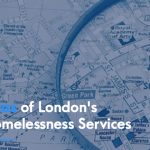The London Housing Foundation is helping to sponsor the 4th conference to be run by the London Network of Nurses and Midwives Homelessness Group. The conference, which will be held on 12th May in London is looking at how integration is needed to make services for supporting homeless people work. When it works well, clients get good support. Patrick’s story shows how this can impact…
People who are homeless need significant coordinated support, and sometimes this is achieved.
Patrick became homeless in his early 30s following the breakdown of his marriage. A long history of alcohol and drug dependence, and a severe mental health episode then led to rough sleeping. His health continued to deteriorate on the street, and Patrick was frequently seen in local A&E departments with intoxication, and injuries from falls and assaults. Patrick became acutely disconnected from society, and numerous attempts by the outreach team to work with him failed.
As time passed concerns for his mental health and capacity increased. Obvious self-neglect, poor memory for times and events, and disordered conversation developed. Numerous teams became aware of Patrick and tried to assist. However, it gradually became apparent that only a coordinated whole systems integrated approach would work, as he had ‘multiple complex needs’. This is a common tag attached to some people, where a client’s needs extend beyond the capabilities of one team. Patrick was refusing to see a GP.
In this case, a community nursing team based in a day centre took the lead. A relationship was gradually built by undertaking wound care, and giving support to return to claiming benefits. A coordinated effort from the nurses, a GP and psychiatrist that provided advice, the outreach team, an outreach nurse, and eventually the police and London Ambulance Service enabled him to be admitted under the mental capacity act, which probably saved his life.
Once in hospital the neuropsychiatric team, social services and safeguarding, addictions, and homeless hospital discharge team then became involved, as well as the ward team – and in the early days of his care a significant effort was required from everyone involved to prevent self-discharge. Patrick’s confusion did not resolve after alcohol detoxification and intravenous vitamins, so he was eventually transferred to a psychiatric hospital for further assessment and medication.
The supported housing team then became involved, and several housing options were considered. After over 10 years on the street, Patrick accepted accommodation in a local hostel where he could continue to drink, but had a safe place to live and a support network to monitor his health. At least nine separate teams had been involved in his care, and this had involved significant coordination.
This conference considers how teams can continue to better integrate to ensure people like Patrick can continue to have their needs met.
To book your place contact Eventbrite or go to the LNNM website





